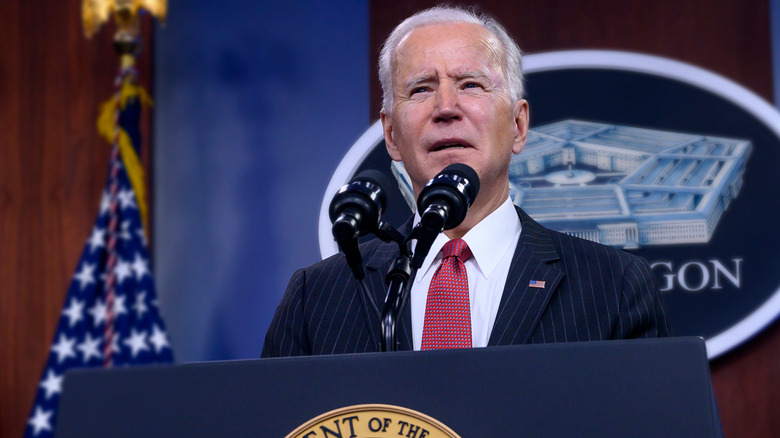Here's What We Know About The Biden Administration Extending The Public Health Emergency Plan For COVID-19
On Wednesday, the Biden administration officially extended the Covid-19 public health emergency for another 90 days, according to the Office of the Assistant Secretary for Preparedness and Response. Even though hospitalization numbers hit a record low just a couple of weeks ago, and 95% of the U.S. shows a low level of community COVID-19 rates (via CNN), public health officials warn that we are not totally in the clear. They further advise that an emergency declaration is still needed to support many Americans who may have lost access to health coverage during the pandemic, according to the New York Times.
The emergency declaration "has given us a tremendous sense of security in an otherwise very insecure and uncertain time," according to Juliette Cubanski, a deputy director of the Kaiser Family Foundation. She told the New York Times, "While we can't live in a state of public health emergency forever, there's still a bit of uncertainty about whether we are ready as a health care system to do without the flexibilities."
How the emergency declaration has boosted public health coverage
The Covid-19 public health emergency declaration was originally signed by former President Donald Trump in March of 2020 (via The White House). The declaration protected the Medicare and Children's Health Insurance Program (CHIP) benefits for those who lost a job during the pandemic (per Centers for Medicare and Medicaid Services). It also provided both funding and flexibility to states in order to allow them to expand services, which resulted in nearly 10 million new enrollments nationwide — a 13.9% increase — by January of 2021.
The current extension will keep these protections and benefits in place for millions of Americans in addition to the emergency telehealth services that are particularly beneficial for people who live in rural areas and otherwise don't have access to in-person services, reports The New York Times. Both private insurers, as well as Medicare, will also continue to cover the costs of at-home tests as long as the emergency declaration is in effect. Public health officials are also keeping their eye on the BA.2 omicron subvariant, as it becomes the dominant Covid-19 strain in the nation and is even leading to an uptick in cases in places like the Northeast (via The Washington Post).


